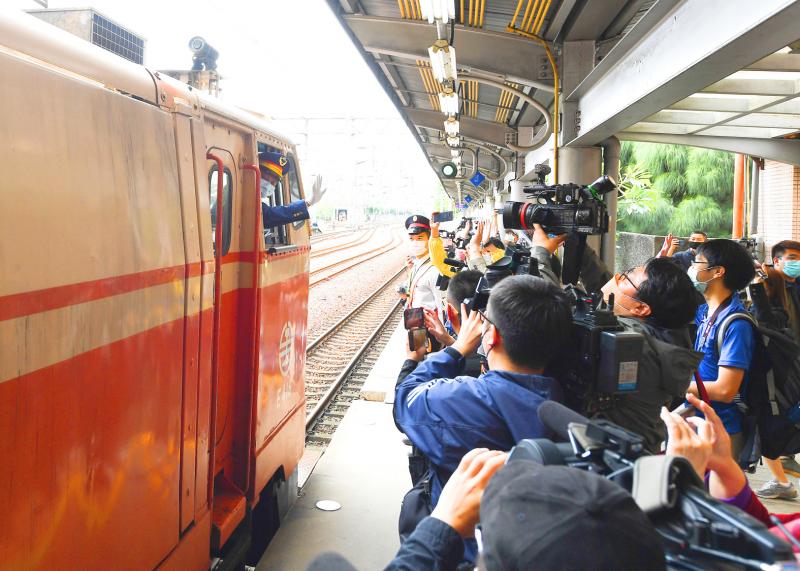Train enthusiasts from across the nation yesterday gathered at train stations in Hualien and New Taipei City to bid farewell to the last of the Fu-hsing semi-express trains, once the workhorse of Taiwan’s passenger railway system.
Fu-hsing Semi-Express No. 605 was the last of its kind to embark on a journey when it left Hualien Station at 6:05am on a three-hour, 51-minute trip to Shulin Station in New Taipei City.
Several train buffs and Hualien residents gathered at the departure station to take photographs and catch a glimpse of the locomotive at it left adorned with commemorative decorations.

Photo: CNA
More people gathered at Shulin Station to watch the train make its final stop at 9:56am and bid the Fu-hsing series farewell.
One train enthusiast, surnamed Lai (賴), said he took the day off work to ride the train one last time with his wife and two children, after having lived with Fu-hsing-series trains his entire life.
Due to the unique braking system of the trains, it takes experience and skill to drive them, the train’s driver said, while its conductor said he was proud and sad to see a rolling stock older than him take its final bow.
The Taiwan Railways Administration (TRA) sold 300 NT$150 commemorative tickets for the Hualien to Xincheng Taroko Station stretch of the train’s final journey, which included official TRA validation.
Rolled out in early 1981, the Fu-hsing series were the first domestically built trains in the nation and the first with air-conditioning.
Once ubiquitous across the nation, Fu-hsing trains were phased out and replaced by more modern rolling stock and high-speed trains on most of the TRA routes.
All of the trains’ services would be taken over by the new EMU900 and existing EMU500 trains, as well as Tze-Chiang Limited Express trains following slight adjustments to the TRA’s schedule that took effect yesterday.
The change is part of a significant modernization of the TRA’s fleet that included the retirement on Monday of the EMU1200 train used on certain Ziqiang Limited Express routes, the TRA said.
The phasing out of older models would enable the TRA to fully utilize its newly acquired Japan-built EMU3000 trains and South Korean-made EMU900 trains that went into service last year.
The bulk of the Fu-hsing trains are to be demolished, except for some passenger cars that would be salvaged and repurposed for use on the South Link Line, the TRA said.

Alain Robert, known as the "French Spider-Man," praised Alex Honnold as exceptionally well-prepared after the US climber completed a free solo ascent of Taipei 101 yesterday. Robert said Honnold's ascent of the 508m-tall skyscraper in just more than one-and-a-half hours without using safety ropes or equipment was a remarkable achievement. "This is my life," he said in an interview conducted in French, adding that he liked the feeling of being "on the edge of danger." The 63-year-old Frenchman climbed Taipei 101 using ropes in December 2004, taking about four hours to reach the top. On a one-to-10 scale of difficulty, Robert said Taipei 101

Nipah virus infection is to be officially listed as a category 5 notifiable infectious disease in Taiwan in March, while clinical treatment guidelines are being formulated, the Centers for Disease Control (CDC) said yesterday. With Nipah infections being reported in other countries and considering its relatively high fatality rate, the centers on Jan. 16 announced that it would be listed as a notifiable infectious disease to bolster the nation’s systematic early warning system and increase public awareness, the CDC said. Bangladesh reported four fatal cases last year in separate districts, with three linked to raw date palm sap consumption, CDC Epidemic Intelligence

Two Taiwanese prosecutors were questioned by Chinese security personnel at their hotel during a trip to China’s Henan Province this month, the Mainland Affairs Council (MAC) said yesterday. The officers had personal information on the prosecutors, including “when they were assigned to their posts, their work locations and job titles,” MAC Deputy Minister and spokesman Liang Wen-chieh (梁文傑) said. On top of asking about their agencies and positions, the officers also questioned the prosecutors about the Cross-Strait Joint Crime-Fighting and Judicial Mutual Assistance Agreement, a pact that serves as the framework for Taiwan-China cooperation on combating crime and providing judicial assistance, Liang

US climber Alex Honnold left Taiwan this morning a day after completing a free-solo ascent of Taipei 101, a feat that drew cheers from onlookers and gained widespread international attention. Honnold yesterday scaled the 101-story skyscraper without a rope or safety harness. The climb — the highest urban free-solo ascent ever attempted — took just more than 90 minutes and was streamed live on Netflix. It was covered by major international news outlets including CNN, the New York Times, the Guardian and the Wall Street Journal. As Honnold prepared to leave Taiwan today, he attracted a crowd when he and his wife, Sanni,